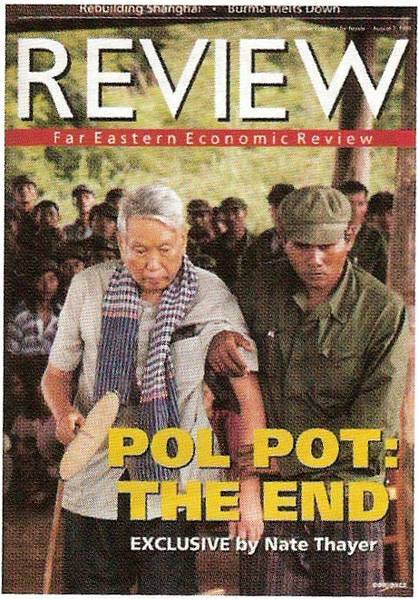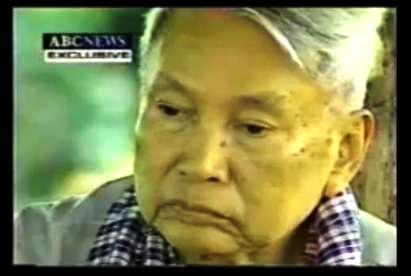In July 1997 photojournalist Nate Thayer was about to become world famous. Nearly 15 years spent reporting in and around Southeast Asia was going to pay off: Pol Pot, former communist dictator of Cambodia and leader of the Khmer Rouge, who oversaw one of the most horrific genocides in history—where approximately 2 million Cambodians were dead as a result of four years of political executions, preventable disease, starvation and forced labor—was going to be tried and denounced by the Khmer Rouge. It was the biggest story in the world, and Thayer was the only American journalist to witness the trial.
Pol Pot never ended up saying much, but Thayer managed to capture the only photographs and video to exist since the dictator’s reign. Ted Koppel, then the anchor for ABC News Nightline, approached Thayer with an agreement: Thayer would give ABC the North American rights to the video for 7 days, and Koppel would ensure in writing that no frame grabs would be made into still pictures, allow the video to be distributed to anyone outside of Nightline, or allow the transcript of the text of the video to be shown to anyone else.
ABC ended up going back on almost every single one of those agreements. They grabbed a still from the video and put it up on their website while also distributing it to the American Press (AP) and The New York Times, who put it on the front page above the fold. In a recent blog post on the issue, Thayer says:
My picture, credited to ABC TV, was published on the front pages of hundreds of newspapers around the world, my footage was distributed around the globe, and my story was written in virtually every major news organ on earth, credited to ABC TV, before I actually had written my own story.
ABC ended up winning a British Press Award for the “Scoop of the Year,” and Thayer was awarded a Peabody as a “correspondent for Nightline.” He turned down the award, the first time anyone had rejected a Peabody in its 57-year history, and in 2000 filed a suit against ABC after years of trying to get payment from a written contract he had with Koppel and after ABC asked him to sign a document saying they did nothing wrong and that he would not use the legal system to seek compensation.
It took seven years to settle the case, with ABC being asked by the court to release all internal communications related to the case. Instead they offered $350,000 on the condition that Thayer sign a non-disclosure agreement. With hundreds of thousands of dollars in lawyers’ fees and taxes, Thayer agreed.
But in recent blog posts Thayer has broken the gag order and called out ABC and Ted Koppel, claiming that they “owe an apology for soiling the integrity of freelancers and the institution of journalism.”
Every freelance journalist alive has suffered under the corporate jackboot of the ABC’s of the media world, their work stolen and never compensated. Usually it is not possible to pay for a legal team to fight them to get remunerated for one’s work.
In a recent ‘Ask Me Anything’ on Reddit Thayer was asked why he’s chosen to come out and talk about the settlement; his response was, “I did it because no one should be allowed to use power, money, and intimidation to enforce the suppression of the truth.”
There’s been no response from ABC or Ted Koppel, although they now legally have the right to take back the settlement. Thayer was briefly in the spotlight earlier this year when he called out The Atlantic after a web editor asked him to contribute an article without payment “for exposure.” The magazine ended up apologizing to Thayer; it will be interesting to see if ABC and Ted Koppel follow suit.



Top 10 test